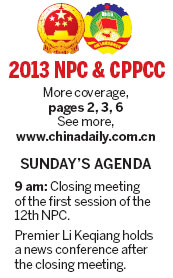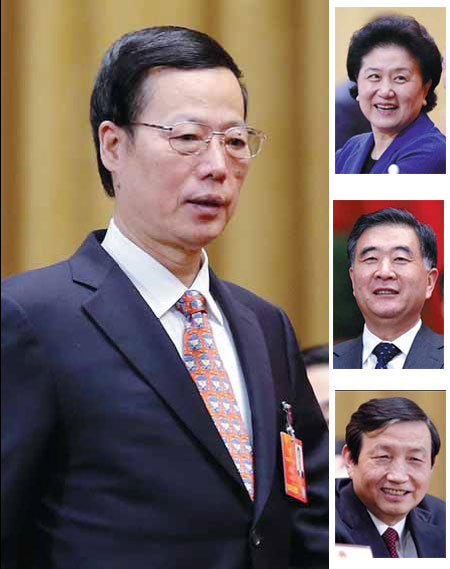Cabinet unveiled
Updated: 2013-03-17 07:49
By Zhao Huanxin, Xin Dingding and Shan juan(China Daily)
|
|||||||||
|
Vice-Premiers will help Li push agenda Zhang Gaoli, Liu Yandong, Wang Yang and Ma Kai (clockwise from top), endorsed on Saturday by lawmakers, form a quartet of deputies for Premier Li Keqiang, who assumed his new post effective on Friday. Photos by Wu Zhiyi / China Daily |

Looking ahead | A brand-new lineup of leaders will take the country forward amid challenges and work to keep the economy growing at a rate of 7 to 8 percent annually.
Lawmakers gathered in Beijing for a 13-day meeting have formally endorsed the members of the State Council, China's Cabinet. Nearly 3,000 legislators voted in nominations by Premier Li Keqiang, endorsing Zhang Gaoli, Liu Yandong, Wang Yang and Ma Kai as his deputies, and another five, including a veteran diplomat, as state councilors.
They also approved the premier's candidates for ministers, the governor of the central bank and the auditor-general at the annual national legislative session, which will end its almost two-week conference on Sunday.
This new lineup will steer the world's second-largest economy forward on progress that is more efficient, innovation-driven and reliant on consumption, as the country's growth rate slides and decades of development at breakneck speed leave a trail of problems including pollution and a growing income gap, analysts said.
They are expected to realize the promises of the Cabinet restructuring and governmental function transformation plan unveiled last Sunday. The plan aims to reduce bureaucracy for a more efficient government in the world's most populous country.
Of the 25 State Council ministries two fewer than before according to the overhaul plan, nine get new ministers, including the Ministry of Foreign Affairs, the National Development and Reform Commission, and the brand new National Health and Family Planning Commission.
New ministers were also approved for the Ministry of National Defense, the State Ethnic Affairs Commission, the Ministry of Supervision, the Ministry of Finance, the Ministry of Land and Resources, and the Ministry of Commerce.
Outgoing foreign minister Yang Jiechi was promoted to state councilor in charge of foreign policies, and succeeded by Wang Yi, China's ambassador to Japan from 2004 to 2007.
Xu Shaoshi, minister of land and resources since 2007, takes charge of the influential National Development and Reform Commission, replacing Zhang Ping, who was elected vice-chairman of the Standing Committee of the 12th National People's Congress two days ago.
The new top economic planner told reporters on Saturday that his new post gave him "great responsibility and heavy pressure".
Jiang Daming, governor of Shandong province, is the new minister of land and resources, replacing Xu.
Xu's biggest challenge now is to "find the solutions to keep China's economy developing at an annual growth rate of 7 to 8 percent for next five to 10 years", according to Chi Fulin, an economist and director of the China Institute for Reform and Development in Haikou, capital of Hainan province.
Urbanization is important to stimulate domestic demands and boost economic development, Chi said.
"It is one of the commission's major responsibilities to promote urbanization, and Xu's rich experience in managing land will be conducive to better pushing forward urbanization and coordinating various interests during the process," he said.
Zhang Yansheng, a researcher with the National Development and Reform Commission, said China's competitive edge in the past three decades was mainly built on low costs, especially the cheap labor of rural migrant workers.
The government must increase spending on education and training further so China's manufacturing sector can move up the value chain, Zhang told the Xinhua News Agency.
Another new minister under the media spotlight on Saturday was Li Bin, who will head the new National Health and Family Planning Commission, a merger of the Health Ministry and the National Population and Family Planning Commission.
Li Bin was governor of Anhui province, East China, and the only female provincial head.
Analysts say she has a tough job.
China's medical reform has entered its most difficult phase, according to Zhao Ping, a political adviser and former president of the Cancer Institute and Hospital of the Chinese Academy of Medical Sciences. The new minister would have to try her best to push the reforms forward, he said, especially those that involve public hospitals.
Zhao pointed out the difficulties of cutting off the long-term dependence of hospitals on commissions from drug and medicine sales, and said that the reform of public hospitals has so far involved more than 300 counties and is expected to spread nationwide.
"The most urgent task facing the new minister would be to figure out an appropriate way to compensate the economic loss of the hospitals in order to sustain the overall reform," he said.
After her appointment was announced on Saturday, Li Bin told reporters she would do her best to bring about the medical and healthcare reforms.
Insiders have high hopes on what she can do.
Lu Jiehua, a professor of social demographics at the Peking University, said he hoped the new commission would substantially help improve the physical condition of newborn babies.
"Li Bin used to head the former family planning commission and her knowledge and experience with reproductive health and family planning would optimize resources available and enhance the overall efficiency of the system," he said.
Contract the writers at zhaohuanxin@chinadaily.com.cn.
Lan Lan contributed to the story.
(China Daily 03/17/2013 page1)
